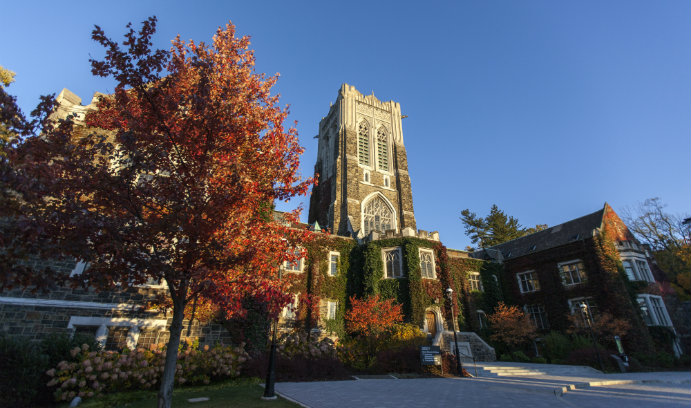Lehigh receives second ADVANCE grant

The NSF ADVANCE PLAN IHE grant targets a level playing field for women associate professors in STEM fields. Lehigh will partner with Georgetown University, Bucknell University, Lafayette College and the United States Military Academy on the project, titled “Patriot League Institutions Mentor Associate Professors WISEly (MAPWISEly).”
Following the completion of a five-year, $2.6 million grant from the National Science Foundation (NSF) ADVANCE-Institutional Transformation (IT) program aimed at increasing the ranks of women in academic science and engineering careers, Lehigh University has received a second ADVANCE grant.
Lehigh will partner with Georgetown University, Bucknell University, Lafayette College and the United States Military Academy on the project, titled “Patriot League Institutions Mentor Associate Professors WISEly (MAPWISEly).” The $704,657 ADVANCE PLAN IHE (Partnerships for Learning and Adaptation Networks across Institutions of Higher Education) award will be shared among the five institutions.
Pat Farrell, provost and vice president for academic affairs, will serve as the lead principal investigator (PI) for the grant. Vince Munley, deputy provost for faculty affairs, and Kristen Jellison, associate professor of civil and environmental engineering and faculty director of Lehigh’s ADVANCE grant, will serve as co-PIs.
“We are excited about this NSF ADVANCE PLAN IHE grant because it is an opportunity for Patriot League institutions to learn from each other about ways to support leadership development for women STEM faculty,” says Farrell. “At Lehigh, we learned quite a bit in the work of our ADVANCE IT grant and we are eager to share some of the things we have learned and see how they might be modified to work at other institutions. It is particularly encouraging to see the high level of interest in collaboration on academic topics like this, from a group that traditionally competes vigorously in athletics.”
Lehigh’s first ADVANCE grant, “Building Community Beyond Academic Departments,” was awarded in 2010 and focused on harnessing the strengths of interdisciplinarity to enhance recruitment, retention, and the advancement of women faculty in STEM fields at Lehigh. This project evaluated Lehigh’s climate and policies, conducted social science research and made recommendations for best practices to transform the university through improved recruitment, retention, career satisfaction and leadership development of early- to mid-career women faculty in STEM.
The goal of the MAPWISEly project is to examine if emerging best practices for mentoring new women associate professors in STEM fields positively impact measures of career satisfaction and serve as indicators of advancement across a diverse network of Patriot League institutions. Partnering institutions will learn how to wisely invest in future associate professor career development and will focus on ways in which they might level the playing field for women faculty in STEM.
“Recently tenured faculty represent a group of professors who are generally neglected in terms of mentoring,” says Jellison. “We have strong and active programs in place to mentor new assistant professors, but there is not much formal mentoring in place for new associate professors. We know from national data, as well as from our own recent COACHE [The Collaborative on Academic Careers in Higher Education] survey, that associate professors are the least satisfied group of professors (as compared to assistant professors and full professors). And among associate professors, women more than men are susceptible to increased service loads, career dissatisfaction, and longer times to promotion. The work of this new ADVANCE grant will focus on evaluating emerging best practices for mentoring new women associate professors in STEM with respect to their impact on career satisfaction, professional success and promotion.”
The MAPWISEly project will establish Faculty Success Fellowships for two cohorts of eligible new associate professor women in STEM across the network. At Lehigh, STEM includes the NSF-funded disciplines of biological sciences, chemistry, earth and environmental sciences, mathematics, physics, psychology, sociology/anthropology, economics and the disciplines within the College of Engineering. The Fellowships will enable faculty to design and implement a mentored, resourced plan of action leading to early success that should position the faculty well on their personal journey to full professor. Intervention, unique to each participating institution, is adapted from Lehigh’s ADVANCE program and informed by other ADVANCE programs.
“With this grant, we will be able to more thoroughly assess the impact of this intentional mentoring on the career satisfaction and success of women associate professors in STEM fields,” says Jellison.
About the NSF ADVANCE Program
The goal of the National Science Foundation’s (NSF) ADVANCE (Advancing Women in Science and Engineering) program is to increase the representation and advancement of women in academic science and engineering careers, thereby contributing to the development of a more diverse science and engineering workforce. ADVANCE encourages institutions of higher education and the broader STEM community, including professional societies and other STEM-related not-for-profit organizations, to address various aspects of STEM academic culture and institutional structure that may differentially affect women faculty and academic administrators. As such, ADVANCE is an integral part of the NSF’s multifaceted strategy to broaden participation in the STEM workforce, and supports the critical role of the Foundation in advancing the status of women in academic science and engineering.
Since 2001, the NSF has invested more than $135 million to support ADVANCE projects at more than 100 institutions of higher education and STEM-related, not-for-profit organizations in 41 states, the District of Columbia, and Puerto Rico, including 24 Experimental Program to Stimulate Competitive Research (EPSCoR) jurisdictions.
Posted on:

